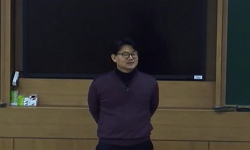The present research was conducted on the law of contempt of court by using a comparative law analysis for the purposes of protecting judicial order and establishing rule of law. As an introductory part, Part I examines the current legal system and re...
http://chineseinput.net/에서 pinyin(병음)방식으로 중국어를 변환할 수 있습니다.
변환된 중국어를 복사하여 사용하시면 됩니다.
- 中文 을 입력하시려면 zhongwen을 입력하시고 space를누르시면됩니다.
- 北京 을 입력하시려면 beijing을 입력하시고 space를 누르시면 됩니다.
https://www.riss.kr/link?id=A108662706
-
저자
하민경 ( Ha Minkyung ) ; 양시훈 ; 계인국 ; 안문희
- 발행기관
- 학술지명
- 권호사항
-
발행연도
2015
-
작성언어
-
-
주제어
법원모욕 ; 사법 집행 ; 형사모욕 ; 민사모욕 ; 직접모욕 ; 간접모욕 ; 법치주의 ; 법정모욕죄 ; 감치 ; 남소 ; 가처분 ; 유지명령 ; 공정한 재판 ; contempt of court ; administration of justice ; criminal contempt ; civil contempt ; direct contempt ; indirect contempt ; rule of law ; frivolous lawsuit ; misconduct of counsel ; injunction ; fair trial
-
자료형태
학술저널
-
수록면
1-300(300쪽)
- 제공처
-
0
상세조회 -
0
다운로드
부가정보
다국어 초록 (Multilingual Abstract)
As an introductory part, Part I examines the current legal system and recent cases in Korea that served as premises for undertaking this research. It also identifies the standard for classification of types of contempt of court.
Part II studies the contempt sanctions of various states on actions that pose a threat to orderly judicial proceedings. For example, under Anglo-American law, it is allowed for a judge to punish summarily an individual who committed direct contempt while the same act does not constitute a crime under German Law.
Part III focuses on the legal systems where defiance of court orders is treated as contempt of court. Since it is axiomatic that continued disobedience or insubordination against court decisions undermine the very foundation of the law, this research suggests that contempt of court can be an efficacious solution for enforcing court orders.
Part IV addresses the necessity of regulating actions that impede the judicial system, such as filing frivolous lawsuits and scandalizing the court by maliciously criticizing it. Pursuing a frivolous lawsuit and scandalizing the court call for contempt sanctions because they prevent the adequate administration of trials.
In conclusion, Part V summarizes the contempt sanctions of UK, US, Singapore, Germany, France, and International Courts thereby providing each system’s characteristics at a glance.
By introducing and analyzing the law of contempt of court in overseas jurisdictions, this research proposes a way to rebuild the rule of law that would guarantee the citizens a fair trial as a constitutional mandate: imposing various types of contempt sanctions on recalcitrant individuals who are regarded as to obstruct the administration of justice.
The present research was conducted on the law of contempt of court by using a comparative law analysis for the purposes of protecting judicial order and establishing rule of law.
As an introductory part, Part I examines the current legal system and recent cases in Korea that served as premises for undertaking this research. It also identifies the standard for classification of types of contempt of court.
Part II studies the contempt sanctions of various states on actions that pose a threat to orderly judicial proceedings. For example, under Anglo-American law, it is allowed for a judge to punish summarily an individual who committed direct contempt while the same act does not constitute a crime under German Law.
Part III focuses on the legal systems where defiance of court orders is treated as contempt of court. Since it is axiomatic that continued disobedience or insubordination against court decisions undermine the very foundation of the law, this research suggests that contempt of court can be an efficacious solution for enforcing court orders.
Part IV addresses the necessity of regulating actions that impede the judicial system, such as filing frivolous lawsuits and scandalizing the court by maliciously criticizing it. Pursuing a frivolous lawsuit and scandalizing the court call for contempt sanctions because they prevent the adequate administration of trials.
In conclusion, Part V summarizes the contempt sanctions of UK, US, Singapore, Germany, France, and International Courts thereby providing each system’s characteristics at a glance.
By introducing and analyzing the law of contempt of court in overseas jurisdictions, this research proposes a way to rebuild the rule of law that would guarantee the citizens a fair trial as a constitutional mandate: imposing various types of contempt sanctions on recalcitrant individuals who are regarded as to obstruct the administration of justice.
동일학술지(권/호) 다른 논문
-
법관의 초 · 중 · 고등학생을 위한 수준별 강의안에 관한 연구
- 사법정책연구원
- 황승태 ( Hwang Seungtae )
- 2015
-
- 사법정책연구원
- 사법정책연구원
- 2015
-
판결에 대한 국민의 이해를 높이고 이를 알릴 수 있는 방안에 관한 연구
- 사법정책연구원
- 양시훈 ( Yang Sihoon )
- 2015
-
국민과 함께하는 모의재판 실시 방안에 관한 연구 - 「일반국민용 모의재판 시나리오 모음집」 수록 -
- 사법정책연구원
- 최은정 ( Choi Eunjung )
- 2015




 KISS
KISS






